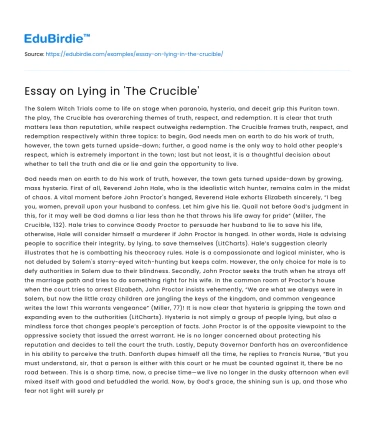The Salem Witch Trials come to life on stage when paranoia, hysteria, and deceit grip this Puritan town. The play, The Crucible has overarching themes of truth, respect, and redemption. It is clear that truth matters less than reputation, while respect outweighs redemption. The Crucible frames truth, respect, and redemption respectively within three topics: to begin, God needs men on earth to do his work of truth, however, the town gets turned upside-down; further, a good name is the only way to hold other people’s respect, which is extremely important in the town; last but not least, it is a thoughtful decision about whether to tell the truth and die or lie and gain the opportunity to live.
God needs men on earth to do his work of truth, however, the town gets turned upside-down by growing, mass hysteria. First of all, Reverend John Hale, who is the idealistic witch hunter, remains calm in the midst of chaos. A vital moment before John Proctor's hanged, Reverend Hale exhorts Elizabeth sincerely, “I beg you, women, prevail upon your husband to confess. Let him give his lie. Quail not before God’s judgment in this, for it may well be God damns a liar less than he that throws his life away for pride” (Miller, The Crucible, 132). Hale tries to convince Goody Proctor to persuade her husband to lie to save his life, otherwise, Hale will consider himself a murderer if John Proctor is hanged. In other words, Hale is advising people to sacrifice their integrity, by lying, to save themselves (LitCharts). Hale’s suggestion clearly illustrates that he is combatting his theocracy rules. Hale is a compassionate and logical minister, who is not deluded by Salem's starry-eyed witch-hunting but keeps calm. However, the only choice for Hale is to defy authorities in Salem due to their blindness. Secondly, John Proctor seeks the truth when he strays off the marriage path and tries to do something right for his wife. In the common room of Proctor’s house when the court tries to arrest Elizabeth, John Proctor insists vehemently, “We are what we always were in Salem, but now the little crazy children are jangling the keys of the kingdom, and common vengeance writes the law! This warrants vengeance” (Miller, 77)! It is now clear that hysteria is gripping the town and expanding even to the authorities (LitCharts). Hysteria is not simply a group of people lying, but also a mindless force that changes people’s perception of facts. John Proctor is of the opposite viewpoint to the oppressive society that issued the arrest warrant. He is no longer concerned about protecting his reputation and decides to tell the court the truth. Lastly, Deputy Governor Danforth has an overconfidence in his ability to perceive the truth. Danforth dupes himself all the time, he replies to Francis Nurse, “But you must understand, sir, that a person is either with this court or he must be counted against it, there be no road between. This is a sharp time, now, a precise time—we live no longer in the dusky afternoon when evil mixed itself with good and befuddled the world. Now, by God’s grace, the shining sun is up, and those who fear not light will surely praise it. I hope you will be one of those” (Miller, 94). Danforth is a more open-minded judge than Reverend Hathorne. Nevertheless, he is still overconfident about his faculty to differentiate truth and facts from fiction. Actually, Danforth suspects that anyone who disagrees with him might be working “against God”. Danforth believes that his decisions reflect God’s will, thus he cannot change them. His stiff ideology drives him vulnerable to hysteria. In summary, people are lying or being advised to lie for self-protection, which is a ridiculous phenomenon in a Puritan town.
Save your time!
We can take care of your essay
- Proper editing and formatting
- Free revision, title page, and bibliography
- Flexible prices and money-back guarantee
A good name is the only way to get other people’s respect, which is extremely important in Salem. To begin, witchcraft is not just a sin, it is also a threat against Reverend Parris’s position and reputation. After seeing girls dancing in the forest, Parris shouts with anger, “Now tell me true, Abigail. And I pray you to feel the weight of truth upon you, for now, my ministry’s at stake, my ministry and perhaps your cousin’s life. Whatever abomination you have done, give me all of it now, for I dare not be taken unaware when I go before them down there” (Miller, 11). Parris is afraid that if people assert there is witchcraft in his household, he will lose his position as minister of Salem. Parris and Abigail are both trying to protect their own good name, which reveals that a ruined reputation in this Puritan town could bring a ruined life. Furthermore, Abigail Williams honestly gains respect and titles as a saint in the town. In a pivotal moment in the court, the skillful liar cries, “I want to open myself! I want the light of God, I want the sweet love of Jesus! I danced for the Devil; I saw him; I wrote in his book; I went back to Jesus; I kissed His hand. I saw Sarah Good with the Devil! I saw Goody Osborn with the Devil! I saw Bridge Bishop with the Devil (Miller, 48)! After Tituba gives names, Abigail realizes that she must do the same, and then a vicious circle of hysteria rises. Crafty Abigail is willing to do anything to protect herself, especially when she hints to others as witchcraft, she has put herself in a supreme position. Conversely, one would argue that there is nothing in the play that directly comments on racism, it undoubtedly plays a huge part in TItuba’s fate.






 Stuck on your essay?
Stuck on your essay?

